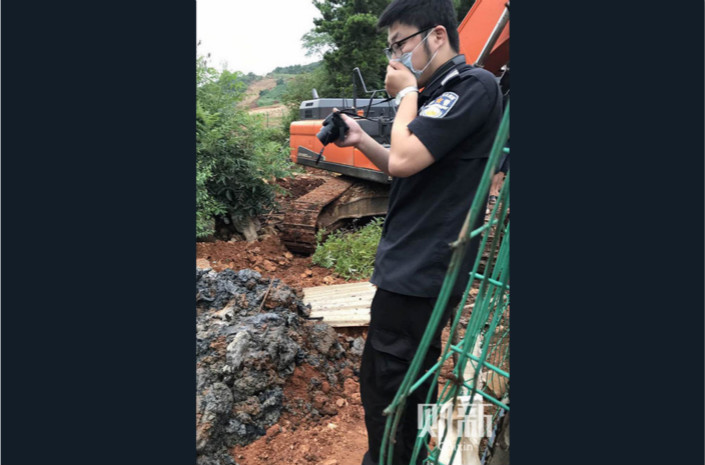Whistleblower Leads to ‘Mass Grave’ of Diseased Pigs
(Huzhou, Zhejiang province) — Over 220 tons of diseased pig carcasses and contaminated earth buried on a mountain in East China has created a stink about improper waste disposal in the country.
Police have detained five suspects after a company commissioned by the city government of Huzhou, Zhejiang province, had buried the dead pigs on Dayin Mountain instead of cremating them as the contract stipulated.
The city government said it had identified three sites where diseased pig carcasses were illegally buried in 2013 and 2014. Workers have dug out animal remnants and contaminated earth weighing 223.5 tons since the excavation started on Aug. 30, according to a statement released on Sunday evening.
“It’s difficult to determine the exact number of dead pigs buried as they have decayed,” said a whistleblower who was among the first to tip off central government environmental inspectors about the issue. He asked not to be named.
“But there must be so many as the stink was so strong that it caused several excavation workers to throw up,” said the source, who had also witnessed the excavation. Earlier, he had told authorities that “tens of thousands of dead pigs” had been buried in the area.
Samples of the excavated remains tested by the local agriculture department had not found any traces of diseases that could be passed on to humans, including foot-and-mouth disease, the state-run Xinhua News Agency reported.
But the discovery was nevertheless alarming as it came just four years after more than 6,000 dead pigs were dumped into local waterways in Jiaxing, also in Zhejiang province. In March 2013, the rotting carcasses were found in Shanghai’s Huangpu River, the source of drinking water for the metropolis’s 23 million residents.
Residents of Qingcaowu village, located close to the excavation sites, have switched to drinking bottled water instead of water from a reservoir at the foot of the Dayin Mountain, according to several locals interviewed by Caixin.
“Once the carcasses decay, pollutants will certainly make their way into the soil and the reservoir,” said one villager who asked for anonymity because they have been told by authorities not to speak to the media.
Local authorities haven’t tested the water in the area’s waterways, including the reservoir in question, for possible contamination. It’s unknown how many residents drink water from the reservoir and streams nearby.
 |
A local public health and anti-epidemic official surveys the site where thousands of pig carcasses were illegally buried. Photo: Caixin |
The whistleblower told Caixin that Huzhou Xinghong, the company contracted by the local government to dispose of the carcasses, had allegedly “colluded with another company under the same owner that was sanctioned by the government to carry out landslide prevention projects to gain access to the plot used to bury the dead pigs.”
“They were misappropriating government subsidies,” the whistleblower accused.
The Huzhou city government offers a subsidy of 80 yuan ($12.31) per dead pig to dispose of carcasses, on top of a one-time payout of 3.6 million yuan, according to a 2014 article published by Chinese Animal Husbandry and Veterinary News. Companies contracted to dispose of animal remains can also borrow 15 million yuan at low interest rates in a five-year period, it said.
City police contacted by Caixin declined to comment on whether Huzhou Xinghong had misappropriated government subsidies.
A deputy general manager at Huzhou Xinghong, who only gave his surname as Huang, tried to distance his company from the looming scandal, saying the burial was ordered by previous owners. He also declined to comment on allegations that the company has abused government subsidies.
The firm is now controlled by a Huzhou businessman named Meng Weiqing. Huzhou Xinghong was licensed to dispose solid waste, whereas another company owned by Meng, named Zhejiang Wuneng Environmental Technology Development Co. Ltd., was authorized to cremate animal carcasses.
The three sites on Dayin mountain have been cordoned off shortly after excavation work began. But drone footage obtained by Caixin on Wednesday shows workers in protective gear putting large black objects into cardboard boxes next to mounds of earth piled up after digging up several large pits.
One Xinghong employee told Caixin that the dark objects recovered were decayed pig carcasses, and workers had taken boxes with animal remnants back to the company for cremation. The wastewater and sludge left in the pits was so thick that they had to use large pipes to clean it up, he said.
Police are currently investigating the case.
Contact reporter Li Rongde (rongdeli@caixin.com)

- PODCAST
- MOST POPULAR




